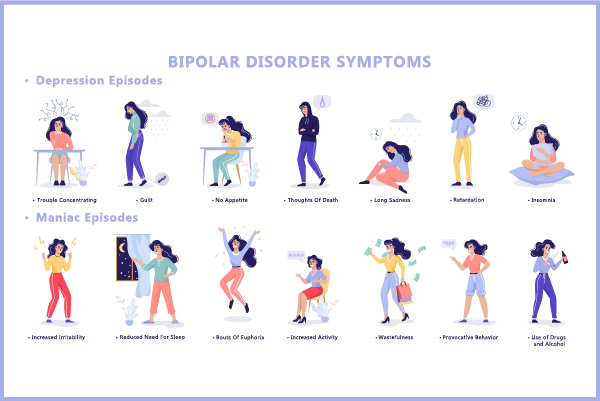Contact Us




Bipolar disorder is a mental illness characterized by extreme mood swings. These shifts in mood range from extreme highs (mania or “manic episodes) to lows (depression or “depressive” episodes).
Bipolar disorder typically manifests itself in a person’s teenage years and early twenties, but there is growing evidence that older adults also get affected by it in the later years of their lives. Mental health tests can help in the identification of the symptoms and diagnosis of the illness.
Individuals with bipolar disorder also experience changes in their thinking, behavior, and sleep. They also experience difficulty carrying out day-to-day tasks, going to work, and maintaining relationships.
Bipolar disorder is a mental illness that impacts your mental health and has a lifetime risk of 0.2-1.2 percent in the population. The onset in most people is between the ages of 15 and 30. It can cause manic and depressive episodes. These occurrences can harm every aspect of your life. A person suffering from bipolar disorder may experience extreme joy or extreme despair. These episodes can have an impact on your ability to function.
Researchers are unsure what causes bipolar disorder or why it only affects a subset of the population. Genetics, brain function, and environment are all likely causative factors.
The symptoms of bipolar disorder can vary from person to person. However, some common symptoms include:
Some of the most prevalent treatment approaches include:
Early diagnosis of bipolar disorder can help with treatment and management. Despite this, many people are misdiagnosed and do not realize they have bipolar disorder until it is too late. This postpones treatment. It may also lead to ineffective treatments. Bipolar disorder, according to the National Alliance on Mental Illness (NAMI), can worsen if not treated. Furthermore, a person’s manic and depressive episodes can become more severe and frequent. Mental health tests administered by a trained mental health professional can help in early detection of symptoms. Mental health therapists can further provide interventions for managing the illness better. This can improve the prognosis of the illness.

Bipolar disorder was once thought to be ” burnout ” throughout a person’s life. The prevalence of bipolar disorder diagnoses in teens and young adults most likely contributed to this belief. According to NAMI, more than half of all cases of bipolar disorder begin before the age of 25.
Several studies have debunked the myth that bipolar disorder only affects teenagers. There has been an increase in research on late-onset bipolar disorder in recent years (LOBD). In adults, it can be difficult to diagnose bipolar disorder symptoms correctly. The symptoms are frequently confused with those of other diseases. Bipolar disorder is diagnosed by a mental health therapist. The diagnosis is based on a combination of factors, including your symptoms, medical history, and family history.
With the growing body of research, treatment options for LOBD have expanded. While there is increasing evidence that medications can treat LOBD, many analyses indicates that more evidence-based studies are needed to recognize clearer treatment strategies.
Typical bipolar disorder medications include:
A doctor will frequently prescribe a combination of these medications in addition to psychotherapy and other forms of support.Living with bipolar disorder can be challenging, but individuals can lead fulfilling lives with proper treatment and support. If you or someone you know is struggling with bipolar disorder, seeking professional help is the first step toward effective management and a brighter future. Remember, you’re not alone in this journey; there is hope for a balanced and stable life with bipolar disorder. Samvedna Care provides specialized care for individuals who suffer from mental illness like bipolar disorder. Our mental health therapists are experts in providing interventions for several psychiatric illnesses. You can choose to give the best care available to your family members at Samvedna Care.